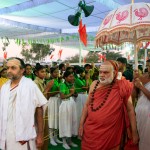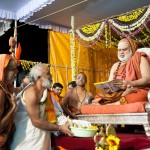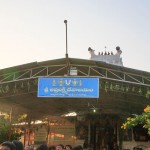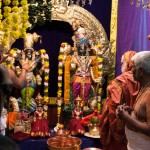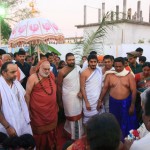
Nirmal: DECEMBER 25-26, 2012
Why Should We Adhere to Sanatana Vaidika Dharma?
Jagadguru Shankaracharya Sri Sri Bharati Tirtha Mahaswamiji arrived at Nirmal on the evening of December 25th. After the Dhuli Pada Puja was performed and Swagata Patrika was offered, the Jagadguru blessed the gathering with a Anugraha Bhashanam.
The Jagadguru said that we have been following the Sanatana Vaidika Dharma in our country since time immemorial. The word Dharma is defined thus – धारणाद् धर्म इत्याहु: धर्मो धारयते प्रजाः – Dharma is that which when adhered to, leads to the welfare of the world, and to happiness and peace in people.
The Dharma Shastras say:
धर्म एव हतो हन्ति धर्मो रक्षति रक्षितः ।
तस्माद्धर्मो न हन्तव्यो मा नो धर्मो हतोऽवधीत् ॥
If we transgress Dharma, we will not attain spiritual welfare or Shreyas. If we protect Dharma (by adhering to it), Dharma protects us. Hence under no circumstances, should anyone swerve from Dharma.
This Dharma is called Vaidika Dharma as it has been described by the Vedas. The Vedas are our primary authority as Parameshwara Himself is the source of the Vedas. As Parameshwara is pristine, so too are the Vedas. If a text is written by any man, however great he may be, there are chances for errors to creep in. To err is man’s nature. No man can claim omniscience. There are always possibilities for a faulty understanding and this is termed as “Bhrama”. Man can also commit a mistake when authoring a text; he may have the right understanding, but can inadvertently blunder when writing the text. Even if a single Akshara changes, the meaning can get distorted completely. For instance, pairs of words such as स्वजनः – one’s own people and श्वजनः – a dog, सकलं – everything and शकलं – a broken piece of stone, सकृत् – once and शकृत् – cow-dung have a difference of only one letter. If an Ayurveda physician were to interchange the words सकृत् and शकृत् when prescribing the dose of medicine, his prescription could be understood as “have cow-dung” instead of “have (the medicine) once”.
Such errors can creep into texts penned by man. However no such faults can creep into the Vedas, that are revealed by Parameshwara Himself. Hence we revere the Vedas as our prime authority.
Sri Adi Shankara Bhagavatpada in his Bhashyam on the Brahmasutras clarifies on the supreme authority of the Vedas stating:
“न हि वेदवाक्यानां कस्यचिदर्थवत्त्वम् कस्यचिदनर्थवत्त्वमिति युक्तं प्रतिपत्तुम् , प्रमाणत्वाविशेषात्”
Sanatana Dharma thus stands on such a firm foundation of the Vedas. That is why even though many have tried to attack our Dharma, their efforts have been in vain.
Bhagavan Himself incarnates to protect this Dharma. Even in a corporation, the Chairman intercedes only when no one else can address a critical situation. Hence if Bhagavan Himself were to incarnate for protecting Dharma, one can surmise how essential Dharma is. That is why Bhagavan Himself proclaimed:
परित्राणाय साधूनां विनाशाय च दुष्कृताम् ।
धर्मसंस्थापनार्थाय सम्भवामि युगे युगे ॥
He also stated the importance of adherence to Svadharma – one’s own Dharma thus:
श्रेयान् स्वधर्मो विगुणः परधर्मात् स्वनुष्ठितात् ।
स्वधर्मे निधनं श्रेयः परधर्मो भयावहः ॥
Everyone attains Shreyas by adhering to Sva-Dharma. One must never resort to Dharma that is not his own, even if he is able to perform it very well. Sva-dharma even if adhered to incompletely or partially would still be better.
Bhagavan also expressed that such adherence to Dharma, even if it is not total and complete, protects one from fear and fall:
स्वल्पमप्यस्य धर्मस्य त्रायते महतो भयात् ॥
Even if you were to worship God for ten minutes, that will result in great benefit. If you were to say, “I do not have even ten minutes for worship”, then that is inexcusable. For you have time for everything else – for reading the news, for entertainment etc. Even as food is essential for survival, a Dwija must realize that Sandhyavanadanam is also essential. Some youngsters say that they feel shy as no one around them performs it. Do you however shun medicine for your own health, just because others do not take it? Even as everyone takes medicine, so too must everyone adhere to Dharma.
The Jagadguru also pointed out that opinion – insult or praise of others – has no place in matters of Dharma. It is Dharma alone accompanies us when we leave the physical body. None of our relatives or our friends can accompany us. The Shastras proclaim this fact thus:
मृतं शरीरमुत्सृज्य काष्ठलोष्टसमं क्षितौ ।
विमुखा बांधवा यान्ति धर्मस्तमनुगच्छति ॥
Hence we must not remain indifferent in matters of Dharma. Everyone desires a happy life, and adherence to Dharma is the means to it. In simple terms, the Shastras term Dharma and Adharma as helping others and causing harm to others:
परोपकारः पुण्याय पापाय परपीडनम् ।
एतत्विद्यात्समासेन लक्षणं पुण्यपापयोः ॥
The act of helping others can be attempted to the best of one’s capabilities. This is called as – यथाशक्ति न्याय – to be able to adhere to Dharma as much as we can. Not everyone can build a temple even though building a temple is a great Dharmic act. Even if you help to spread the word about the effort to construct a temple, it qualifies as Dharma.
Hence there is provision for everyone to adhere to Dharma as per the Shastras. No one is exempt from the opportunity to adhere to Dharma. If the wealthy use their money, the poor can use their bodily strength to engage in Dharma. The physically challenged can adhere to Dharma by remembering the Lord mentally. However one must make use of the opportunity graced upon us by God. If a parent makes arrangements to send his son to school, and if the student rather than availing this facility never attends school and whiles away his time, then who is to blame? Similarly, being blessed with a human birth and with well functioning faculties, we al have the necessary abilities to adhere to Dharma
Your body and senses can be termed purposeful only if they are put to proper use. Sri Adi Shankara Bhagavatpada states:
सा रसना ते नयने तावेव करौ स एव कृतकृत्यः ।
या ये यौ यो भर्गं वदतीक्षेते सदार्चतः स्मरति ॥
Our tongue will attain purity only if it chants divine names. It cannot become pure by talking about a thousand other things. Our eyes get their purity only by beholding the all-attractive form of Bhagavan in temples and not by other sights. Our hands are for the purpose of performing Puja to Bhagavan. If they do not perform worship, they are not to be called ‘hands’. Likewise, our mind should ever contemplate on the lotus feet of Bhagavan. If all the above organs are used by a person for the purpose of divine worship, he is indeed the most fortunate one.
There is no guarantee of a another human birth. Hence it is wise to exert the body in adherence to Dharma. By adhering to Dharma, we attain Shreyas and also become exemplars for others.
The Jagadguru then remembered the visit of His Guru in the Telangana region in 1966, and His own visits to Nirmal in 1976 and 1985. The Jagadguru made a special note of the devotion of the citizens of Nirmal who had welcomed the Jagadguru into their town after a period of 27 years.
The Jagadguru gave Darshan to the devotees on the following morning. On 26th December evening, the Jagadguru started from Nirmal towards Vemulawada. Enroute, the Jagadguru visited Ashtalakshmi temple at Korutla and had Darshan of the central deity, Sri Adi Lakshmi Narayana and the Ashtalakshmis. The Jagadguru also blessed the devotees with an Anugraha Bhashanam describing the nature of God, who sports many names and forms and pointing out that God is but One.
